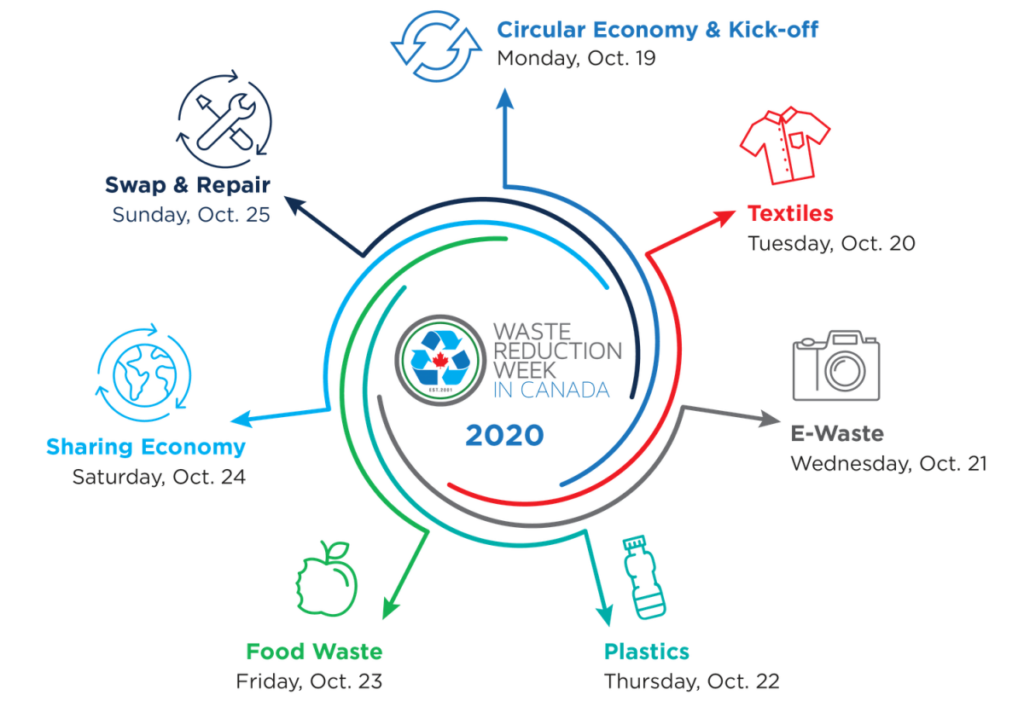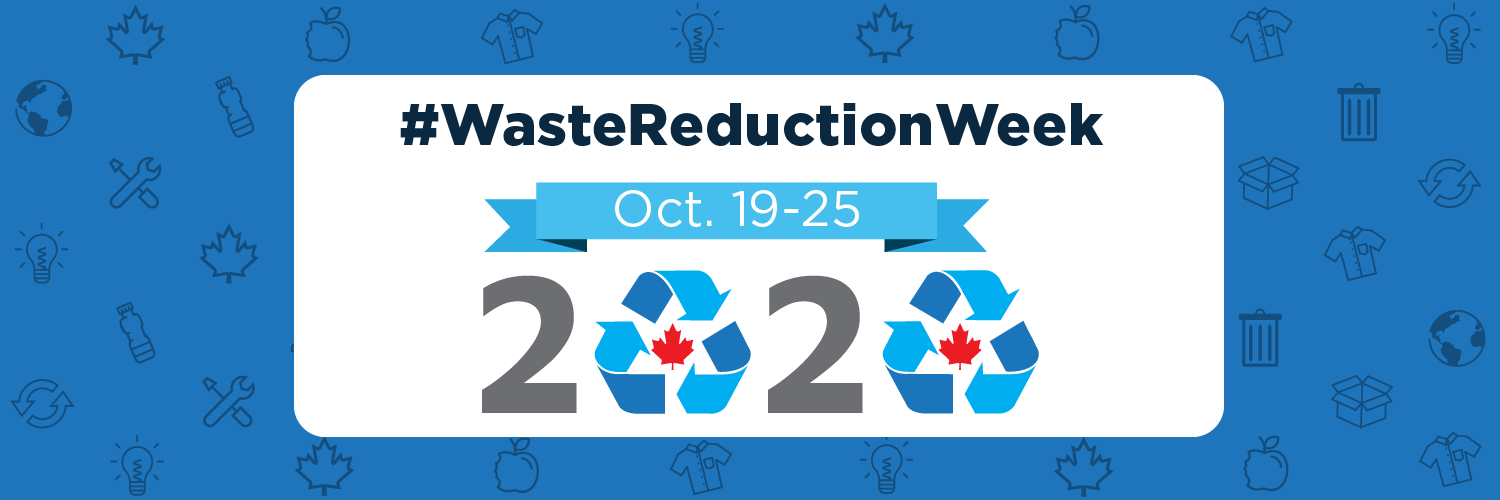- Canadians produce more than 31 million tons of waste annually
- In 2030, Canada has committed to zero plastic waste
Waste Reduction Week (WRW) in Canada is a year-round initiative, this year it is celebrated from October 19-25. Countrywide numerous events took place to spread awareness regarding the importance of waste management. The initiative started in Canada in the mid 1980s, marking the concern regarding resource efficiency and waste reduction. It is relevant to understand that the principle way to reduce waste is to take steps that avoid its creation in the onset

Image source: Waste Reduction Week Canada
Interestingly, the 7 days of the WRW signifies 7 different themes- including the circular economy, textiles, electronics, plastics, food waste, swapping and repairing.
The Circular Economy Monday (October 19)
The first day of WRW emphasised on reuse. It talked about circular economy approach as against the linear one. Like in case of plastic straws- it is learnt Canadians use 57 million plastic straws every day. The production and use of plastic straws are a linear economy where raw materials are used to produce something; the product is used and then it is simply disposed-off. While in the case of circular economy those goods are produced that can be used again and again, like in case of paper straws.
Textiles Tuesday (October 20)
The textile production today operates in a linear fashion. Hence, emphasis was laid on reuse, restyling and swapping. It was put forward- more and more non-renewable resources are being used in production of textile today. These outfits are learnt to wear out faster as the small microfibres break off very easily. While on the other hand, if the textiles are produced with high quality resources, the prices go up. With it comes the challenge of it being trendy and as we all know with the rapid changing trends- the chances of reuse come down drastically.
E-Waste Wednesday (October 21)
With the rapidly advancing technology, electronic waste is on the verge of becoming the biggest problem in the field of waste management. E-waste is also the most hazardous one as it involves leakages of toxic elements like mercury and lead, that are harmful for the environment. Hence, a circular economy approach has been emphasised in this case as well. The use of gadgets for a longer period, supporting repair in place of replacement and buying from companies that encourage buy backs- are all encouraged. Hence keeping our electronics away from the landfills for as long as possible.
Plastic Thursdays (October 22)
Making simple lifestyle changes regarding plastic usage has been emphasized on plastic Thursdays, as every action counts. A circular economy is encouraged in the form of production of reusable plastic items and recyclability. Steps like recovering plastic from the oceans and using it in making products like shampoo bottles, shoes and other materials have been quite commendable. In 2030, Canada has committed to zero plastic waste
Food Waste Friday (October 23)
Roughly $10 billion worth food is wasted across Canada annually. Acknowledging such a drastic number, the theme involved taking a pledge and committing to make choices that avoid food wastage.
Sharing economy Saturday (October 24)
The importance of access over ownership holds value in the Sharing Economy theme of NWRW. It promoted various things like ride sharing apps, libraries, rental services and online music/video streaming. The whole idea revolves around circular economy in the form of use of a single item by several users- hence promoting re-usability of the resource.
Swap and repair Sunday (October 25)
Wrapping up with the Waste Reduction week, Swap and Repair Sunday promotes the idea of circular economy by encouraging swapping and repairing of the available resources. It involves swapping and even repairing items like clothing, furniture, automobiles as against throwing those away and contributing to the ever-increasing landfills.
On city level, numerous initiatives have been taken to mark the Waste Reduction Week across Canada. City hall at the City of Lethbridge, Alberta, Canada was glowing green and blue to mark the city’s consciousness towards waste management. As part of this yearly initiative, this year Lethbridge focused on wastage related to food leftovers. The city recognised food waste as prime- as it was determined that about one-fifth of all groceries end up as left-overs. To address the issue, the city encouraged a contest regarding tips and tricks for using leftovers (#LethbridgeLovesLeftovers).
British Columbia motivated its people to go back to the basic 3Rs of Reduce, reuse and recycle.
“During Waste Reduction Week this year, we are asking British Columbians to go back to basics with our campaign, and focus on the 3Rs of reduce, reuse and recycle. With a global pandemic, we have had to shift our routines, which means cooking more at home, doing our shopping online, or ordering take-out more often,” Brock Macdonald, chief executive officer of the Recycling Council of British Columbia (RCBC) said; as reported by The Northern View.
“Waste Reduction Week is a great opportunity for all British Columbians to make simple changes in their lives. Some of these actions can include buying in bulk to reduce packaging or reinventing your leftovers into a soup or casserole to reduce food waste. Or try a little do-it-yourself magic by learning to repair your clothes or electronics with the help of online tutorials,” Macdonald added.
With initiatives going on with almost all the communities, even corporate giants made sure they played their part in waste reduction. Toronto based coffee and donut giant Tim Hortons announced on October 19 the significant improvements to their paper napkins. The new napkins are produced with 100% recycled material and use 25% less raw materials as compared to the old quality. The company is also reported to be in the process of phasing the use of plastic straws, hence recognising the amount of plastic waste is created because of those.
Canada has been quite active in recognising the issues related to waste and effective measures have been taken every now and then to address it. With the agenda of every action counts, the country is moving closer to their future goals of a greener Earth.
Learn more about circular economy and Waste Reduction week at https://wrwcanada.com/en
Written by: Mansi Aggarwal Kwatra

About the Author: Passionate for the environment, Mansi who resides in Canada is a writer, environmental photographer and a voice-over artist.

